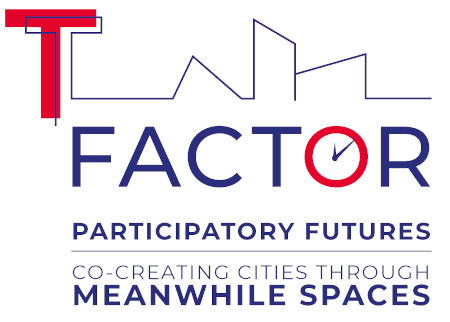T-Factor: Unleashing future-facing urban hubs through culture and creativity-led strategies of transformative time
Research area Transformative governance in cities and regions | Jürgen Dieter Schultze | Alejandra Castro-Giron | Dr. habil. Rick Hölsgens
T-Factor demonstrates how heritage, culture and creativity can drive urban transformation with meanwhile uses in urban regeneration to unleash vibrant urban hubs for inclusivity, social innovation, and entrepreneurship.

European Commission (EU) - Executive Agency for Small and Medium-sized Enterprises; Horizon 2020
The T-Factor project addresses transition time, i.e. the time between the adoption of municipal master plans to actual implementation, in relation to the regeneration of historic urban areas and aims to enrich urban development with new offerings of cultural and social innovation. The subject matter will be how culture, creative collaboration and broad engagement can unleash vibrant urban centers for inclusive urban regeneration, social innovation and entrepreneurship. The three core elements of cultural heritage, culture and creative industries result in a plurality of perspectives and meanings of urban spaces that lead to a shared space-shaping of vibrant laboratories (place-shaping and place-making).
An international community of practice is to be formed, which together with the pilot cities - Amsterdam, Bilbao, Kaunas, Lisbon, London, Milan - will test new approaches to the vitalization of historic urban areas already in the implementation phase. By looking at past urban regeneration processes in selected case studies - Barcelona, Dortmund, Florence, Lodz, London, Marseille, New York, and Shanghai - the project provides the pilot cities with a unique learning environment for capacity building to design radical new approaches to urban regeneration.
Throughout the urban development process, cultural and creativity-based approaches are used to support local citizens' opportunities for participation and action. The respective master plans of the pilot cities for the urban renewal processes will be enriched by interim use concepts, promote the collaboration of different actors as well as cross-sectoral and cross-policy cooperation. In this way, social innovation and entrepreneurship will be promoted in the urban renewal processes, contributing to the Global Sustainability Goals (SDGs) at the local level.
The Social Research Center is developing two so-called Transformation Labs (T-Labs) on the topics of "Digitalization and Urban Production" and "Social Innovation and Social Inclusion".
- ANCI TOSCANA ASSOCIAZIONE. Italy
- LAMA DEVELOPMENT AND COOPERATION AGENCY SOCIETA COOPERATIVA. Italy
- PLUSVALUE (PLUSVALUE). United Kingdom
- THE UNIVERSITY OF THE ARTS LONDON. United Kingdom
- POLITECNICO DI MILANO. Italy
- ASOCIACION CULTURAL OPEN YOURKOLEKTIBOA. Spain
- COUNTRY ITALIA SRL. Italy
- FUNDACION TECNALIA RESEARCH & INNOVATION Spain
- AALBORG UNIVERSITET Denmark
- ARNIANI MARTA France
- FRICHE LA BELLE DE MAI France
- STICHTING WAAG SOCIETY Netherlands
- KAUNO TECHNOLOGIJOS UNIVERSITETAS Lithuania
- UNIVERSIDADE NOVA DE LISBOA Portugal
- FUNDACIO PER A LA UNIVERSITAT OBERTA DE CATALUNYA Spain
- ENTIDAD PUBLICA EMPRESARIAL LOCAL BILBAO EKINTZA Spain
- KAUNO MIESTO SAVIVALDYBES ADMINISTRACIJA Lithuania
- TECHNICAL UNIVERSITY OF DORTMUND Germany
- CITY OF DORTMUND Germany
- I-PROPELLER NV Belgium
- LODZ-MIASTO NA PRAWACH POWIATU Poland
- LONDON BOROUGH OF CAMDEN United Kingdom
- KAUNAS 2022 Lithuania
- UNIVERSITA DEGLI STUDI DI MILANO Italy
- TONGJI UNIVERSITY China
The overall goal of T-Factor is to transform a variety of historic areas in selected European cities - Amsterdam, Bilbao, Kaunas, Lisbon, London, Milan - into vibrant centers for inclusive urban regeneration through social innovation and entrepreneurship. Cultural heritage, culture and creative industries will be combined to realize new, transformative approaches to interim uses.
T-Factor offers an innovative approach to urban development that combines culture and creative engagement with interim use concepts to achieve three specific but integrated goals:
- Supporting the collaboration of diverse stakeholders, including broad public participation, in the co-creation and co-production of urban renewal processes;
- Enabling the formation of local innovation ecosystems for cultural heritage and creative industries in the pilot cities by exploring novel cross-cutting themes (in so-called Transformation Labs) that can contribute to business and job creation, social, economic and cultural inclusion, and a sustainable urban environment. Thematic overlaps arise from new combinations of themes, sectors, and actors that can unlock new urban meanings, services, products, and lifestyles (e.g., arts, science, and technology to advance the health sector; circular economy approaches to new models of production and consumption, etc.).
- Promoting adaptable and resilient approaches to the targeted master plans and PPPs by transforming them into flexible and open structures that are able to accommodate new spaces, activities, and meanings emerging from below, better respond to citizens' needs, and help urban developers* make informed decisions.
The project starts by looking at past urban renewal processes in selected case studies - Barcelona, Dortmund, Florence, Lodz, London, Marseille, New York and Shanghai - and derives recommendations for the development of urban renewal processes in the pilot cities - Amsterdam, Bilbao, Kaunas, Lisbon, London, Milan. The recommendations will be bundled in a transformation agency that will support the individual urban renewal processes in the formation of local implementation teams (local coalitions). These are in turn enriched by thematic transformation labs (T-Labs) that support and promote the development of interim use concepts in the form of pilot projects. The Transformation Agency manages the T-Factor urban development methodology. It features a combination of design, arts & creativity, community building, and robust monitoring and evaluation expertise, and guides Local Coalitions throughout the co-design, implementation, piloting, evaluation, and documentation of interim uses. The agency employs a variety of approaches that collectively contribute to a "T-Factors Urban Development Methodology." This includes specific training, tools, and reporting activities, as well as reflection, peer learning, and knowledge integration.
Seven thematic transformation labs (T-Labs) provide the supporting infrastructure for the pilot cities to experiment with novel, mission-oriented, thematic intersections driven by cultural heritage, culture, and creativity. Decentralized within the consortium, the T-Labs develop diverse collaborations among participating urban renewal centers, universities, businesses, and social organizations, and provide Local Coalitions with inspiration, actionable insights, tools, and mentoring to spur implementations.




![[Translate to English:] [Translate to English:]](/storages/zentraler_bilderpool/_processed_/a/f/csm_Kontakt_b86e8d8ecc.png)
![[Translate to English:] [Translate to English:]](/storages/sfs-sowi/_processed_/6/c/csm_Glasfront_sfs_Header_eae6d325d3.jpg)
